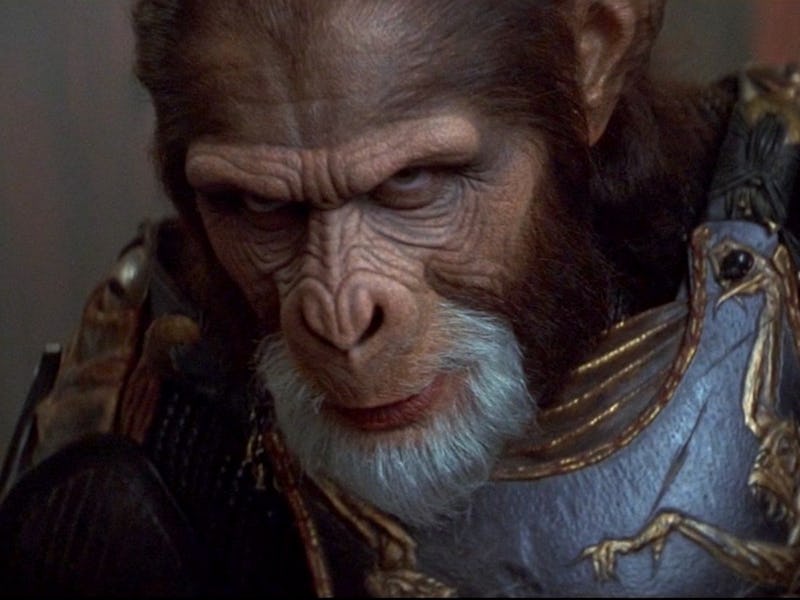You need to watch the most absurd sci-fi reboot on Amazon Prime ASAP
Tim Burton's finest hour, this is not.

In the 1980s, Tim Burton made a name for himself.
After emerging as a concept artist at Disney, Burton showed an eagerness to meld horror and comedy together, with results bordering on the surreal. After 1985’s Pee-Wee’s Big Adventure and 1988’s Beetlejuice, he showed that he could deliver unique visuals on a budget. He quickly became bankable, though audiences associated him with larger-than-life eccentricity.
Around this time, another discussion began in Hollywood. 20th Century Fox president Craig Baumgarten had been impressed with a young director named Adam Rifkin, who later went on to direct family-friendly fare like Mouse Trap. Baumgarten wanted to hear Rifkin’s ideas, and the rising star had one big one: bringing back Planet of the Apes, which had been dormant since 1973.
Eventually, Burton’s path intersected with Baumgarten and Rifkin’s idea, with head-scratching consequences. Burton’s 2001 Planet of the Apes reboot gave a director known for big-screen oddity his biggest and oddest project yet; while audiences were interested, critics bashed the franchise back into hibernation. Still, now that Planet of the Apes (2001) is streaming on Amazon Prime, here’s why you should give it a shot.
As recounted in David Hughes’ Tales From Development Hell: Hollywood Filmmaking the Hard Way, Baumgarten initially granted Rifkin’s dream, planning for an Apes movie starring either Tom Cruise or Charlie Sheen. But Baumgarten was soon replaced, and new studio heads put the project on the back burner, leaving it to simmer for decades through endless rewrites.
Burton was not Rifkin’s replacement. Nor was he the second, third, or fourth choice. Among the directors who passed on or eventually left the project: Sam Raimi, Oliver Stone, Peter Jackson, Chris Columbus, Roland Emmerich, Phillip Noyce, the Hughes Brothers, and James Cameron. Each director had brought their ideas for rebooting the franchise, with some wanting to pattern after another movie featuring original star Charlton Heston, The Omega Man. In contrast, others imagined a kid-friendly comedy with apes skiing.
By the late ‘90s, sci-fi was in vogue. Having scored a hit with Sleepy Hollow, Burton was available and interested in a “reimagining.” Producer Richard D. Zanuck, in Hughes’ book, felt, “When you say Planet of the Apes and Tim Burton in the same breath, the idea is instantly explosive, like lightning on the screen.”
A scene from Planet of the Apes.
Zanuck was partially correct. The movie is gorgeous, from Burton’s early space station to Rick Baker’s make-up to the dramatic long shots of the ape city. Baker’s make-up especially stands out, making the apes from militant General Thade (Tim Roth) to peacenik Ari (Helena Bonham Carter) look like credible apes while showing their emotions.
The problems start at the center, with the main character Leo Davidson (Mark Wahlberg). He’s an Air Force pilot with a grudge against primates because they’ve become astronaut test pilots (which doesn’t make much sense, but sure). Burton’s successes, from Pee-Wee to Edward Scissorhands, have centered around oddballs. Even when they’re stoic, like Michael Keaton’s Batman, they are still highly odd.
There’s nothing odd about Leo. He’s a black hole of charisma who has no genuine interest in the world around him, which is weird considering the level of detail Burton has put into the ape world. We see apes at dinner parties reminiscing over their youth, playing cards and accusing other apes of cheating, discussing ape religion, and in general living whole lives with humans as their slaves.
At one point, while the humans are running for freedom, Burton has them run through a series of ape bedrooms, with each ape engaging in extreme human behaviors (flirting with their husband, taking off a wig). It’s hard to think of a reason for these scenes, other than Burton thought they were funny and pleasant in an odd sort of way.
A scene from Planet of the Apes.
The most noticeable of these apes is Limbo (Paul Giamatti). Giamatti plays Limbo, a cruel seller and enslaver of humans, like a huckster. Filled with one-liners, Giamatti seems to understand that being in a Tim Burton movie means you can be weird.
The set was grueling for all involved. Wahlberg certainly wasn’t having any fun during his early scenes where he had to engage with animals for extended periods. As he recounted on The Graham Norton Show in 2017, Burton had “wanted us to get acclimated with the chimps, and anytime I would go near [Helena Bonham Carter,] the chimps would start attacking me. They’d start trying to punch me in the nuts, like my 5-year-old-son. Like really bad, like nonstop. … The chimps were constantly trying to attack me.”
Perhaps the unique plot point of Planet of the Apes is the ending, which takes a bizarre twist that feels somewhat brazen. Have you made it to the end? Congrats. Now, you get to see something that makes absolutely no sense. Setting up for a sequel that never happened, a sudden change of scenery from ape world to the Lincoln Memorial doesn’t need to hold to any so-called logic.
It’s not a good movie by any stretch, but when it allows itself to be ridiculous, it’s easy to see why Hollywood thought Tim Burton’s Planet of the Apes would solve all their problems.
Planet of the Apes (2001) is now streaming on Amazon Prime.